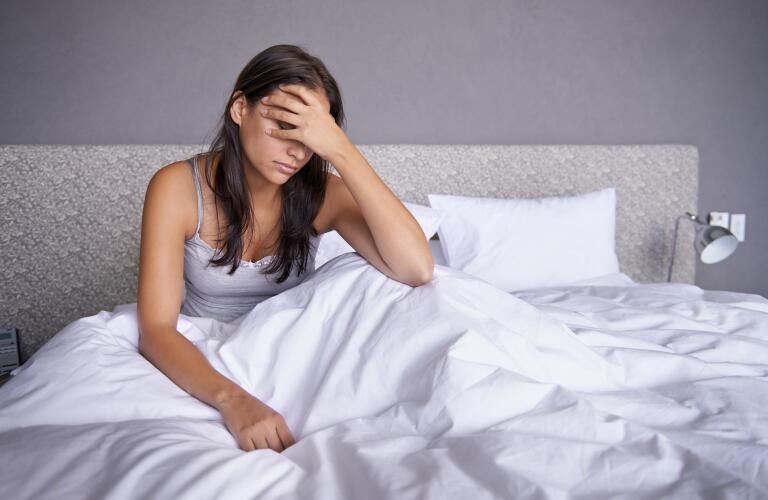How to Ease Anxiety-Induced Sleeplessness

Anxiety-induced sleeplessness is a common issue that affects many individuals.
This article aims to provide practical strategies and techniques to alleviate the symptoms of anxiety that disrupt sleep.
By understanding the underlying causes and triggers of anxiety-induced sleeplessness, individuals can take proactive steps to create a calming bedtime routine and implement relaxation techniques.
Additionally, managing stress and anxiety throughout the day, exploring natural remedies and supplements, and seeking professional help and support can contribute to improved sleep quality and overall well-being.
Key Takeaways
- Anxiety-induced sleeplessness is caused by feelings of anxiety or heightened arousal, both psychologically and physiologically.
- Identifying triggers and patterns helps individuals understand the factors contributing to sleeplessness and implement strategies to mitigate their impact.
- Creating a calming bedtime routine and sleep-friendly environment promotes relaxation and improves sleep quality.
- Implementing relaxation techniques, such as deep breathing and progressive muscle relaxation, can help reduce anxiety and improve sleep.
Understanding Anxiety-Induced Sleeplessness
Anxiety-induced sleeplessness refers to the difficulty in falling or staying asleep caused by feelings of anxiety or heightened arousal.
The causes of anxiety-induced sleeplessness can vary, but they often involve a complex interplay of psychological, physiological, and environmental factors.
Psychologically, individuals may experience racing thoughts, worry, or rumination that prevent them from relaxing and transitioning into sleep.
Physiologically, anxiety can lead to increased heart rate, shallow breathing, and muscle tension, making it difficult to achieve a state of physical relaxation necessary for sleep.
Additionally, environmental factors such as noise, light, or an uncomfortable sleep environment can exacerbate anxiety and further disrupt sleep.
The impact of anxiety-induced sleeplessness can be significant, leading to daytime fatigue, impaired cognitive function, and decreased overall quality of life.
Addressing the underlying causes of anxiety and implementing effective coping strategies are crucial in managing and alleviating anxiety-induced sleeplessness.
Identifying Triggers and Patterns
Identifying triggers and patterns is crucial in understanding the relationship between anxiety and disrupted sleep. By recognizing the specific triggers that lead to anxiety and subsequently affect sleep, individuals can develop strategies to mitigate their impact. Triggers can vary widely among individuals, but common ones include work stress, relationship issues, financial concerns, and health problems. Recognizing patterns is also essential, as it helps individuals identify the recurring themes or events that consistently contribute to their anxiety-induced sleeplessness. This information can be used to implement proactive measures such as relaxation techniques, cognitive-behavioral therapy, or lifestyle changes. To illustrate the importance of identifying triggers and patterns, the table below provides an example of how triggers and patterns can be linked in an individual’s experience of anxiety-induced sleeplessness.
| Trigger | Pattern |
|---|---|
| Work stress | Difficulty falling asleep and restless sleep |
| Relationship issues | Frequent waking up during the night and nightmares |
| Financial concerns | Racing thoughts and prolonged sleep onset |
| Health problems | Sleep fragmentation and early morning awakening |
Creating a Calming Bedtime Routine
Establishing a structured bedtime routine has been shown to promote relaxation and improve sleep quality. A relaxing bedtime routine consists of engaging in activities that help calm the mind and body before sleep. These activities can include reading a book, taking a warm bath, or practicing relaxation techniques such as meditation or deep breathing exercises.
Creating a sleep-friendly environment is also crucial for enhancing relaxation and improving sleep quality. This can be achieved by keeping the bedroom cool, dark, and quiet, as well as using comfortable bedding and pillows.
Additionally, it is important to avoid stimulating activities, such as using electronic devices or consuming caffeine close to bedtime, as these can interfere with relaxation and disrupt sleep.
Implementing Relaxation Techniques
Implementing various relaxation techniques, such as progressive muscle relaxation or guided imagery, has been found to effectively reduce physiological arousal and promote relaxation before bedtime.
Deep breathing, a common relaxation technique, involves taking slow, deep breaths to calm the body and mind. This technique activates the body’s relaxation response, resulting in decreased heart rate and blood pressure.
Progressive muscle relaxation, on the other hand, involves tensing and then releasing different muscle groups to promote muscle relaxation and overall relaxation. This technique helps individuals become aware of muscle tension and learn to release it.
Both deep breathing and progressive muscle relaxation have been shown to reduce anxiety and improve sleep quality. By incorporating these techniques into a bedtime routine, individuals can effectively ease anxiety-induced sleeplessness and promote a restful night’s sleep.
Managing Stress and Anxiety Throughout the Day
Managing stress and anxiety throughout the day involves adopting effective coping strategies and engaging in stress-reducing activities that promote emotional well-being and overall mental health. Implementing stress management and daily self-care practices can help individuals maintain a balanced and healthy lifestyle. Some effective coping strategies include deep breathing exercises, practicing mindfulness and meditation, engaging in physical activity, and maintaining a healthy diet. These activities can help reduce the negative effects of stress and anxiety, promote relaxation, and improve overall well-being. It is important to prioritize self-care and make time for these activities regularly in order to manage stress and anxiety effectively. The following table provides examples of stress-reducing activities and coping strategies:
| Stress-Reducing Activities | Coping Strategies |
|---|---|
| Deep breathing exercises | Practicing mindfulness and meditation |
| Engaging in physical activity | Maintaining a healthy diet |
| Spending time in nature | Journaling and expressing emotions |
| Listening to calming music | Seeking support from loved ones or professionals |
Exploring Natural Remedies and Supplements
Natural remedies and herbal supplements have gained attention as potential interventions for stress and anxiety management due to their perceived therapeutic properties and minimal side effects.
These natural remedies include various herbs, such as valerian root, chamomile, and lavender, which have been traditionally used for their calming effects. Valerian root, for instance, has been found to have sedative properties and may help to promote relaxation and improve sleep quality.
Chamomile, on the other hand, contains compounds that have been shown to have anxiolytic effects, reducing anxiety symptoms. Additionally, lavender has been found to have a calming effect on the central nervous system, potentially reducing anxiety and promoting sleep.
While more research is needed to fully understand the effectiveness of these natural remedies and herbal supplements, they offer a promising avenue for individuals seeking alternative approaches to manage stress and anxiety.
Seeking Professional Help and Support
Seeking professional help and support is an essential step for individuals experiencing stress and anxiety as it allows them to receive expert guidance and evidence-based interventions. Professional therapy offers a structured and confidential space for individuals to explore the underlying causes of their anxiety and develop coping strategies.
Therapists utilize various techniques such as cognitive-behavioral therapy (CBT) or mindfulness-based stress reduction (MBSR) to help clients manage their symptoms effectively.
Support groups, another valuable resource, provide individuals with a sense of community and understanding, knowing they are not alone in their struggles. These groups offer a safe environment to share experiences, gain insights, and receive empathy and support from others who have experienced similar challenges.
Overall, seeking professional therapy and engaging in support groups can greatly contribute to the effective management of anxiety and stress.
Frequently Asked Questions
Can Anxiety-Induced Sleeplessness Be Cured Completely?
The effectiveness of relaxation techniques in curing anxiety-induced sleeplessness is uncertain. While these techniques may provide temporary relief, a complete cure for anxiety-induced sleeplessness has not been established. Further research is needed to determine long-term efficacy.
How Long Does It Usually Take to See Improvements in Sleep After Implementing Relaxation Techniques?
The improvement timeframe for sleep after implementing relaxation techniques varies widely and depends on individual factors. Exercise has been shown to have a positive impact on sleep, but the specific effects on anxiety-induced sleeplessness are not well-established.
Are There Any Specific Foods or Drinks That Can Worsen Anxiety-Induced Sleeplessness?
Caffeine intake and alcohol consumption have been found to potentially worsen anxiety-induced sleeplessness. These substances may disrupt sleep patterns, increase restlessness, and contribute to the overall exacerbation of anxiety symptoms during nighttime.
Can Certain Medications for Anxiety Actually Worsen Sleeplessness?
Certain medications for anxiety may have side effects that can worsen sleeplessness. It is important to consult a healthcare professional to discuss alternative treatments that may be more suitable for managing anxiety-induced sleeplessness.
Are There Any Alternative Therapies or Practices That Can Help Manage Anxiety-Induced Sleeplessness?
Alternative therapies and natural remedies are often sought after as potential solutions for managing anxiety-induced sleeplessness. These approaches encompass a wide range of practices, techniques, and interventions that aim to alleviate anxiety and promote better sleep quality.









